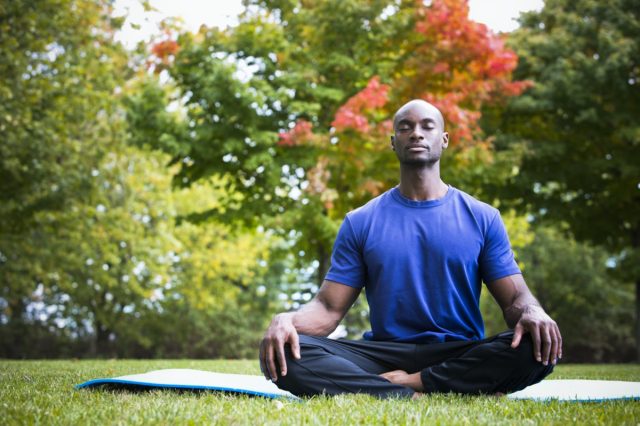11 Best Tips for Getting Through a Panic Attack, According to Experts

If you struggle with anxiety or panic disorder, you're not alone. According to the National Institute of Mental Health, approximately 31.1% of U.S. adults will develop anxiety disorder during their lifetime. And while the physical manifestations of anxiety can vary wildly from person to person, one of the more noticeable symptoms of the condition is having panic attacks.
While therapy and medication may help you reduce the severity or frequency of your panic attacks, there are also ways to make it through a panic attack when they do occur.
Read on to discover doctor- and therapist-recommended tips for getting through a panic attack. And for more ways to improve your wellbeing, check out The One Vitamin Doctors Are Urging Everyone to Take Right Now.
Take a deep breath

If you want to help reduce some of the physical symptoms you're experiencing as part of your panic attack, clinical social worker Eric E. Strom, LICSW, BCD, CEO of Mental Health Solutions, LLC, recommends a simple breathing technique.
"Take in a breath to a count of six. Hold for a count of one or two, and then exhale to a count of six," recommends Strom, who notes that counting to four instead of six can work, too. "This method works because it activates your parasympathetic nervous system, which is the rest and digest part of your nervous system."
Take off your shoes

Sometimes, the best way to get through a panic attack is to focus on other physical sensations you're experiencing.
"Push your feet into the ground and feel the pressure of your feet on the ground. You can even remove your shoes (if able) and notice the sensations of the floor underneath you. Activating these sensations helps to bring your awareness to your body and out of your mind," says Strom.
Related: For the latest mental health tips delivered to your inbox, sign up for our newsletter!
Don't deny what's happening

As counterintuitive as it seems, trying to fight against the anxiety you're feeling may make things worse in the long run.
"Recognize the anxiety for what it is and remember that it won't kill you," says Kristel Roper, a licensed professional clinical counselor and licensed marriage and family therapist at Dauntless Counseling.
"This may sound like an extreme statement, but oftentimes my patients will talk about how it feels like they are dying or having a heart attack when they are having a panic attack. Panic attacks are incredibly uncomfortable (to put it mildly), but our bodies are designed to handle everything that occurs during a panic attack," Roper explains. "Remember that fighting the anxiety by trying to deny what's happening or trying to make the anxiety go away will only make your anxiety worse."
Try to release tension in your body

While you may not be able to instantly rid yourself of the mental strife you're experiencing, trying to work through some of the physical tension you're feeling may help you make it through your panic attack.
"Take note of any tension in your body that you could let go of. For instance, is your jaw clenched? Are your shoulders scrunched up by your ears? Are your hands twisted up? Are you sitting ramrod straight or curled up tightly in a ball?" asks Roper. "Try to start with your face and check in with each part of your body all the way down to your toes to see if there's a place you can relax a little bit more. Relaxing your body physically will help you to relax mentally."
Practice the 5-4-3-2-1 trick

Even if your mind is going a mile a minute, you can bring yourself back into the present moment by practicing what's known as the "5-4-3-2-1" trick.
"Concentrate on five things you can see around you, four things you can hear, three things you can feel, two things you can smell, and one thing you can taste," suggests Roper.
Repeat a list of facts in your head

If you're still struggling to find a sense of calm, Roper recommends focusing on easily accessible facts to bring yourself back into the moment.
"Focus on concrete facts, such as your name, the date, where you are, what you were doing before you panicked, etc.," Roper suggests.
Create a new sensation in your body

Instead of simply trying to will away the feelings you're having, psychotherapist Cass Biron, LCSW, recommends trying to create a new sensation in your body.
"There is a reason that movies show the anxious character splashing water on their face—this is engaging the lizard brain and subtly jolting the nervous system to presence," says Biron. "If you can't find a sink, popping a small peppermint or sour candy can awaken the mind. If available to your body and environment, running in place to discharge and complete the stress response is a great tool."
Ask your panic to get bigger

While you may want to feel anything but the intensification of your panic attack symptoms, therapist Cameron Murphey, LMFT, says that asking your panicked feelings to grow larger may actually bring you relief.
"Asking a panic attack to get bigger sounds paradoxical, but many of my clients have found it extremely effective in stopping their panic attacks outright. You might say, 'Come on, show me what you got,' or, 'Give me more. I'm not running from this,'" says Murphey. "This works because it shifts your brain out of the fight-or-flight response that produces panic. It also sends your brain the message that you're standing up for yourself and can take care of yourself, both of which produce a greater sense of safety."
Repeat a mantra

Having a mantra handy can help calm you down in a hurry when you feel panicked or out of control.
"Repeat positive thoughts or thoughts of gratitude. You should have a mantra that you say to yourself when you are in the midst of a panic attack. It should be something you practice writing down in a journal and can say again and again in your mind to calm yourself in the midst of an attack," says Sheetal DeCaria, MD, a double board-certified integrative physician at Revitalize Medical Center.
Call a loved one

There's nothing like talking to someone who cares about you and your wellbeing to help bring you back down when you're experiencing a panic attack.
"Make sure the person is aware that you experience panic attacks," recommends Michele Navarro Ishiki LCSW, CSAC, ICADC, clinical director and lead therapist at The Ohana Addiction Treatment Center. "Set up a plan beforehand to call or even text them when you are experiencing symptoms."
Talk to a professional

If you want to reduce your risk of having panic attacks in the future, consulting a psychiatrist is a great way to help rule out underlying causes and come up with an action plan.
"Panic attacks can happen for a myriad of reasons: substance use, medications, medical issues (like thyroid disease), anxiety disorders, etc. A psychiatrist would be able to do a comprehensive evaluation and provide guidance for diagnosis and treatment, including but not limited to medications and psychotherapy," says psychiatrist Priscilla Hidalgo, MD, of Lux Psychiatry, PLLC.
For more ways to boost your wellbeing, check out these 30 Reasons Not to Panic.








